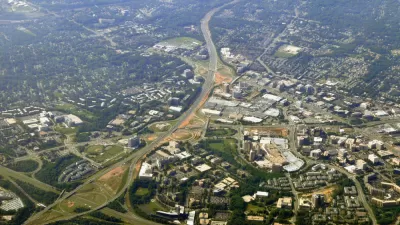On his Per Square Mile blog, Tim de Chant has been kind enough to answer one of mankind's biggest existential questions: What’s more energy efficient, shopping online or in stores?
[W]ith the boom in online shopping for everything from jeans to Jujyfruits, people have grown concerned that e-commerce’s simplicity comes with an environmental price," writes de Chant. "The concern mostly centers around the delivery’s carbon footprint. All those UPS trucks rumbling down every street in American surely can’t be a good thing."
De Chant reviews the findings of a few of the many studies that "have looked at the difference in carbon emissions between items ordered over the internet and those purchased the old fashioned way." And what has he found? "Fret not. Your Amazon delivery probably has a trimmer footprint than a simple trip to the store."
"Why are brick-and-mortar stores so inefficient?" he continues. "It turns out that transporting people to the store to select something and then getting them back home again requires a lot of energy. You also have to consider that items sold in stores were distributed from a central warehouse. When you place an order online, that trip transforms from one to the store to one directly to your home."
FULL STORY: What’s more energy efficient, shopping online or in stores?

Planetizen Federal Action Tracker
A weekly monitor of how Trump’s orders and actions are impacting planners and planning in America.

Maui's Vacation Rental Debate Turns Ugly
Verbal attacks, misinformation campaigns and fistfights plague a high-stakes debate to convert thousands of vacation rentals into long-term housing.

San Francisco Suspends Traffic Calming Amidst Record Deaths
Citing “a challenging fiscal landscape,” the city will cease the program on the heels of 42 traffic deaths, including 24 pedestrians.

Amtrak Rolls Out New Orleans to Alabama “Mardi Gras” Train
The new service will operate morning and evening departures between Mobile and New Orleans.

The Subversive Car-Free Guide to Trump's Great American Road Trip
Car-free ways to access Chicagoland’s best tourist attractions.

San Antonio and Austin are Fusing Into one Massive Megaregion
The region spanning the two central Texas cities is growing fast, posing challenges for local infrastructure and water supplies.
Urban Design for Planners 1: Software Tools
This six-course series explores essential urban design concepts using open source software and equips planners with the tools they need to participate fully in the urban design process.
Planning for Universal Design
Learn the tools for implementing Universal Design in planning regulations.
Heyer Gruel & Associates PA
JM Goldson LLC
Custer County Colorado
City of Camden Redevelopment Agency
City of Astoria
Transportation Research & Education Center (TREC) at Portland State University
Jefferson Parish Government
Camden Redevelopment Agency
City of Claremont




























